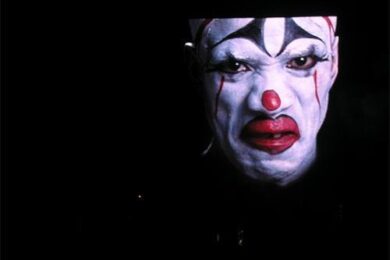There was a time when pop music projected a certain strangeness. Not necessarily in terms of musical experimentation, but through a look, an implicit lifestyle, and an attitude that suggested the possibility of escaping from the urban / suburban / rural routine that most of its audience would inevitably be born into. Pop music that was a gateway- via the sounds on your stereo, the posters on your wall- to a freer, heightened existence, charged with meaning and myth, style and subversive sexuality. It was certainly the case in the heyday of Bowie and Bolan, and continued right up to the mid-nineties, when Brett Anderson or Brian Molko regularly smuggled a certain romantic otherness into the Top of the Pops studios. Not just celebrating glamour – an empty word in itself – but shouting that you could live in your imagination, and that this wasn’t just escapism, but the tool with which we actively perceive and create reality. That we don’t have to passively accept the consensus that is forced upon us, and the roles it’s assumed we have to play.
You don’t see so much of that in pop music anymore. But you do get it with Birdeatsbaby. Though still unsigned, and releasing records on their own Dead Round Eyes label, the Brighton quartet nevertheless make Pop Music- albeit of a slyly subversive nature. Melodic, confidently arranged and powerfully performed, and with a sharp, clean-edged production job from Jason Rubal – whose CV includes the Cure and Dresden Dolls – it’s possible to imagine Feast of Hammers infiltrating the daytime Radio 1 playlist. And indeed, Birdeatsbaby are already starting to reach the right people, having played at the Secret Garden Party, been tipped in The Independent by the esteemed Simon Price, and most recently featured in session on Tom Robinson’s 6music show. But most importantly Birdeatsbaby inhabit a clearly defined world of the imagination- dark, sexual, vulnerable yet strong- and, like all the best bands, exist in a wider artistic, cinematic and literary tradition that they invite their audience to explore further.
Playing out like a self-contained gothic opera, Feast of Hammers is burlesque classical in every sense, driven by Sondheim-esque piano melodies, Brecht / Weill song structures, a chamber-rock rhythm section and a recurring psychosexual obsession with water and drowning. ‘Love Will Bring You Nothing’ is a song that Nick Cave could’ve written for Freddie Mercury; a Grimm tale of love, obsession and revenge. On the title track taut, descending guitar arpeggios give way to Psycho stabs of violin and drums and finally an eruption of orchestral violence. Released as a single, it’s a high-class anthem for fetish freaks and the S&M set, a ‘My Way’ for the bondage and blowtorch crowd.
Throughout, singer-pianist Mishkin Fitzgerald’s vocals are the centre of attention, softly seductive yet fiercely demanding you keep your distance, shifting suddenly from a whispery falsetto to a deep menacing growl on ‘What the Water Gave Me’ and ‘The Sailor’s Wife’, where her stately keyboard arrangements and filthy-pure vocals are reminiscent of fellow Sussex band The Indelicates. ‘Incitatus’ is a stomping nightmare nursery rhyme, everything blurred and shadowy then rushing and intense, while ‘Double Nine’ morphs from straight-forward cabaret vamp into a concoction of tribal drums and savagely scything strings, reverting too soon to type.
If there’s one criticism that could be levelled at Birdeatsbaby, it’s that they’re working within the limits of a style, with strictly defined conventions; within those boundaries they do innovate and experiment, but never to the extent of stepping out of the dark cabaret genre that defines them (and of which Dresden Dolls and the Tiger Lilies are probably the most well-known exponents). In some ways though, this adherence to the rules of the form serves them well; they know exactly how to manipulate the expected props, use the stylistic shorthand, how far to twist the knife and how far they can surprise without alienating their audience. And if I personally would like to hear more dirt, more genuine psychosis and desperation in what’s a pretty slick finished product, then it seems churlish to criticise ambition in a band for whom DIY needn’t necessarily mean lo-fi. Birdeatsbaby celebrate the strange and obsessive, the freakish and the free-thinking, and in so doing open a door in the most shadowy corner of the listener’s imagination. We should fling this filth at our pop kids, and we should do it now.



